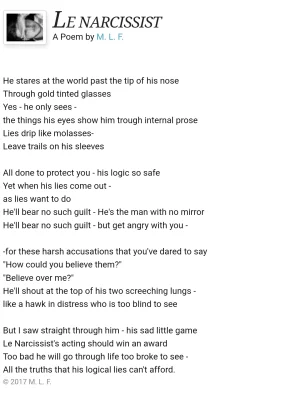Some good discussion has been had thus far.
Language is a funny thing. It's also a powerful thing.
Perhaps we can distinguish between one who is
a narcissist and one who is
narcissistic. They both tend to be used interchangeably in common speak, but as
@atree pointed out
narcissist is a loaded term.
A narcissist would refer to one who would be considered to have a diagnosable mental disorder - narcissistic personality disorder:
in which people have an inflated sense of their own importance, a deep need for admiration and a lack of empathy for others. But behind this mask of ultraconfidence lies a fragile self-esteem that's vulnerable to the slightest criticism. [
Source]
Note also, that narcissist is a noun, and so it's describing certain traits - i.e. narcissistic traits - that have became or are so pronounced that they dominate the very personality of the person themselves, and partly defines who they are as a person and their correlating mind set, attitudes, values and behaviors. I would avoid saying, totally defines them, since I still like to believe that their is an underlying fundamental vestige of goodness that remains in such persons - a crack of light (greater or less in some I'm sure) allowing for the possibility of some form of redemption. Although that opens up another whole aspect - that certain, or almost all dare I say, mental illnesses or disorders are not intentionally and directly willed, and hence the person who suffers from a particular disorder is not morally at fault for simply having such a condition. They would only be morally deficient - unethical persons - to the extent they freely chose wrong behaviours, a culpability which could be diminished more so or less so depending on various factors that might partly inhibit volitional freedom, including the condition itself. It's beyond me how NPD would fair in this regards but this principle probably applies. Yet it gets messy if immoral behaviours are part of a diagnosis - still, a distinction can be made between the condition and the immoral actions made by one suffering from a condition, actions which are signs of such a condition as opposed to been actions determined by such a condition and which are therefore synonymous with it. Now a can of worms has been opened as this could be discussed for ages! (Sorry, tangent!).
Whereas we can reserve the term
narcissistic for general speak. Since unlike saying this person is a narcissist (which can be a value judgement, but I don't think it always is - one
could simply be discerning a plain reality) which generally tends to create an US and THEM dichotomy, and can be used as an escape clause to avoid compassionate interactions with, or openness to, such labeled persons, the term
narcissistic simply describes traits had or perceived to be had by another, and it is a more helpful, accurate and potentially less divisive term because every person on earth has narcissistic traits - i.e. our very selves! Thus if someone seems to be highly narcissistic instead of saying - "That person is a narcissist and so I will keep vigilant in dealing with them"; we could say: "That person seems to be overly narcissistic, and so I will keep vigilant in dealing with them" OR "That person seems to be narcissistic etc." Keeping in mind that
narcissistic is an adjective - thus it is describing (realities or perceptions had) as opposed to defining or labeling (or diagnosing).
narcissistic - having or showing an excessive interest in or admiration of oneself and one's physical appearance.
I'm glad I read through these posts and that
@Ryso89 started the thread, as I'll resolve henceforth to keep in mind these distinctions.

